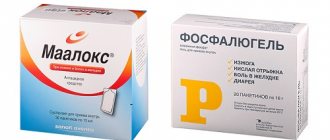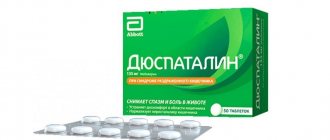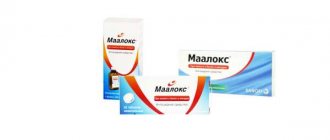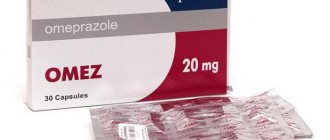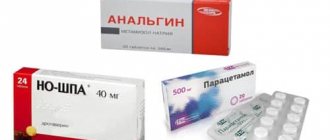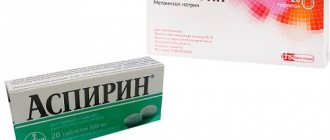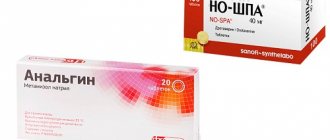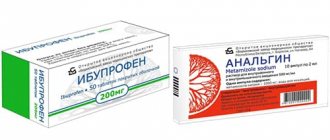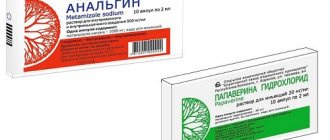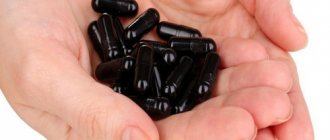For cerebral vascular spasms, pain, and body heat, doctors most often prescribe Analgin or Citramon. The drugs have much in common, but there are also differences between them. You can purchase medications in pharmacies without a prescription.
For cerebral vascular spasms, pain, and body heat, doctors most often prescribe Analgin or Citramon.
Mechanism of action of the drug
Analgin has an antipyretic and analgesic effect. It is classified as an NSAID, but has a slight anti-inflammatory effect. This is due to the fact that the main component does not actively influence the synthesis of prostaglandins, which are involved in the development of inflammation. The medication normalizes body temperature and eliminates pain.
Citramon is characterized by a more pronounced anti-inflammatory effect and has antipyretic, blood thinning and analgesic properties. As inflammation decreases, pain also goes away. The medicine increases the reflex excitability of the spinal cord, dilates the blood vessels of the internal organs and brain, and increases blood flow.
What's included
The main component of Analgin is metamizole. Additional substances: talc, potato starch, sugar, calcium stearate. In addition to paracetamol, caffeine and acetylsalicylic acid, Citramon contains polysorbate, calcium stearate, talc, potato starch, cocoa powder, citric acid monohydrate.
"Citramon"
Unlike Analgin, Citramon contains acetylsalicylic acid, caffeine and paracetamol, which is the difference between these drugs. Each of the substances included in the composition has a different effect, thanks to which the medicine received its initial distribution.
Acetylsalicylic acid (aspirin) has an antipyretic effect, which can be initiated by an inflammatory process. Aspirin relieves pain, improves circulation and reduces blood clotting. Caffeine promotes brain function by dilating blood vessels and improving blood flow, relieving pain and eliminating drowsiness. Caffeine also stimulates physical and mental activity. Paracetamol has an antipyretic effect and can act as an analgesic.
Despite its sufficient effectiveness, Citramon has a large number of contraindications, ranging from urticaria, asthma or acute rhinitis, to increased excitability and sleep disturbances.
The drug is prescribed for pain syndromes of varying severity, fevers, acute respiratory infections and influenza. Like Analgin, Citramon is rarely used in Western countries due to its negative effect on human internal organs, especially the liver.
What is the difference and what is better - Analgin or Citramon
The drugs have different main components. This leads to different indications for use and possible side effects. Analgin can cause a rare and extremely dangerous blood disease, so this medication is not used in some countries. These medications are prohibited during pregnancy and breastfeeding.
If a severe headache caused by a spasm occurs, Analgin shows the greatest effectiveness.
If your head starts to hurt due to pressure, use Citramon. For inflammatory processes and high fever, this medicine is also used.
Citramon is used if the head starts to hurt due to pressure.
Which is safer?
Different compositions cause not only different indications for use, but also possible side effects. Safety of use is an important aspect and what also distinguishes Analgin from Citramon.
Metamizole can cause a rare but very dangerous blood disease, especially in children, which is why Analgin is banned in a number of countries. Despite the fact that childhood is not a strict contraindication (under 18 years of age only as prescribed by a doctor), it is better not to give Analgin to children. For emergency pain relief, the child is given ibuprofen or another specialized remedy. Adults should not take Analgin if they have diseases of the blood or hematopoietic organs, asthma, or serious problems with the kidneys and liver.
Citramon is also not so harmless, mainly due to the content of acetyl-salicylic acid. With single doses, a dose of 240 mg is unlikely to cause any negative effects, but if you take Citramon tablets regularly, you can harm the stomach or intestines, even causing ulcers. Therefore, people with gastritis, enteritis, or especially stomach ulcers in the past, need to be especially careful with this medicine, and in case of exacerbation of these diseases, it is better to choose Analgin.
Both drugs are contraindicated during pregnancy and breastfeeding. Taking Citramon and Analgin together is not recommended due to the high load of this combination on the liver and the double risk of side effects.
special instructions
With long-term use of Analgin, the condition of peripheral blood should be regularly monitored. In the first 3 months of life, the drug should be given with caution.
Under the influence of Citramon, the blood begins to clot more slowly, which must be taken into account by the doctor before surgery. With prolonged use of the drug, monitoring of the condition of the liver and peripheral blood is required. In patients who are predisposed to the accumulation of uric acid, taking Citramon can cause an attack of gout.
Pregnancy and lactation
Analgin is used in extreme cases during pregnancy. Breastfeeding is stopped during the treatment period and resumed 2 days after taking the last tablet.
Citramon is prohibited in the first and third trimester of pregnancy. Restrictions during lactation are the same.
Childhood
Citramon is allowed from 15 years of age, the second drug is allowed from 2 years of age.
Elderly age
Both medications are approved for use by people over 65 years of age. But they must be careful because their metabolism is slow.
How they affect the body
The analgesic effect of drugs is due to different mechanisms of action on the body and differs in the duration and severity of the effect.
The drug is used to relieve pain.
Analgin
The drug blocks the process of delivering pain signals to the brain and increases heat transfer from the body. The antipyretic and antispasmodic effect is achieved within 30 minutes after taking the drug. The medication is prescribed to relieve the symptoms of fever, relieve moderate pain from neuralgia or arthralgia, relieve toothache or headache.
Citramon
A combined drug containing paracetamol, caffeine and acetylsalicylic acid. The drug promotes a pronounced decrease in body temperature during the development of the inflammatory process, dilation of blood vessels in the brain, which helps improve blood circulation, stimulate brain function and relieve pain.
The instructions for use allow the use of the medicine to activate the mental and physical forces of the body, get rid of drowsiness, increase psychomotor reactions under increased mental stress, lack of sleep or rest. The use of the medication is allowed and, if necessary, increase the blood pressure.
The instructions for use allow the use of the medicine to activate the mental and physical powers of the body.
Side effects of Analgin and Citramon
Analgin can cause:
- Quincke's edema, skin rash, anaphylactic shock;
- agranulocytosis, leukopenia.
Analgin can cause Quincke's edema, skin rash, and anaphylactic shock.
Side effects caused by Citramon:
- erosive and ulcerative lesions of the gastrointestinal tract, hepatotoxicity, nausea, vomiting, gastralgia;
- nephrotoxicity;
- increased blood pressure, tachycardia;
- tinnitus, blurred vision, headache, dizziness.
Directions for use and dosage
It is recommended to take Analgin in a single dosage of no more than 500 mg. Frequency of administration – no more than 3 times a day. For children, the drug is prescribed based on weight: up to 10 mg per 1 kg of body weight. The frequency of taking Analgin also increases - up to 4 times a day.
Citramon is prescribed in the amount of 1-3 tablets at a time. Moreover, the frequency of administration is 2-3 times a day. It must be remembered that this drug affects the hematopoietic system and helps thin the blood. For this reason, it is necessary to control the amount of the drug. The maximum daily dose is 6 tablets.
Therapy with Analgin leads to the appearance of symptoms: convulsions, nausea, vomiting, coma, agranulocytosis, hemorrhagic diathesis, rash. The drug also has a cardiotoxic effect. Citramon promotes the development of intoxication. In this case, signs of poisoning appear. As the dosage increases, lethargy, drowsiness occurs, breathing becomes difficult, collapse and convulsions develop.
Contraindications to the use of Analgin and Citramon
Analgin is prohibited for:
- excessive sensitivity to the components of the product;
- blood diseases;
- severe liver or kidney dysfunction.
Contraindications for Citramon:
- renal failure;
- vitamin deficiency K;
- portal hypertension;
- hypoprothrombinemia;
- ulcers and erosions of the gastrointestinal tract;
- surgical interventions that are accompanied by bleeding;
- sleep disturbance;
- pancreatitis.
Indications for use
These two components should not be used in the following cases:
- For stomach and intestinal ulcers.
- If you have gout.
- Coronary heart disease.
- For liver and kidney diseases.
- With frequent changes in blood pressure.
- Intolerances, for example due to allergic reactions.
- Sleep disorders.
It is advisable to replace these two medications with other analogues (Ilvagin, Baralgin, etc.), having first consulted with a leading specialist.
Analgin is used for pathological conditions:
- fever due to the development of infectious and inflammatory diseases;
- pain of various etiologies: dental, headache, muscle, discomfort caused by neuralgia, migraine, dysmenorrhea;
- recovery after surgery (as part of complex therapy).
Analgin is used for fever due to the development of infectious and inflammatory diseases.
Citramon also has a wide range of applications, which is due to its multicomponent composition:
- painful sensations of various etiologies;
- neuralgia, causing discomfort;
- menstrual irregularities accompanied by pain;
- pain in muscles, joints;
- elimination of signs of acute respiratory infections when the temperature rises.
Analgin is not recommended for use in a number of cases:
- severe damage to the liver, kidneys;
- individual intolerance to active components:
- deficiency of glucose-6-phosphate dehydrogenase.
Citramon has more contraindications:
- hypersensitivity;
- diseases of the gastrointestinal tract, bleeding;
- bronchial asthma due to intolerance to acetylsalicylic acid and the formation of nasal polyps;
- disruption of the hematopoietic system;
- liver and kidney diseases;
- bleeding after surgery;
- hypertension;
- glaucoma;
- deficiency of glucose-6-phosphate dehydrogenase;
- vitamin K deficiency;
- cardiac ischemia;
- sleep disturbance.
Interaction with other drugs
Analgin should not be used simultaneously with other analgesics. When using tricyclic antidepressants, the toxicity of the drug increases. Phenylbutazone and barbiturates reduce the effectiveness of this medication. The medicinal properties of the drug are enhanced under the influence of sedatives, H2-histamine receptor blockers, and codeine.
Citramon must not be combined with the following drugs:
- Ergotamine;
- Chloramphenicol;
- Metoclopramide;
- antiepileptic drugs;
- barbiturates;
- NSAIDs;
- anticoagulants.
What is better to drink for a headache: citramon or analgin?
Instructions
With frequent headaches, many are interested in what is best to take to get rid of the unpleasant sensations. There are many medications that can cope with this problem. The following text will help you choose from inexpensive drugs, Analgin or Citramon.
For frequent headaches, take Analgin or Citramon to get rid of unpleasant sensations.
What is the difference and what is better - analgin or citramon?
When choosing a drug, everything depends on the characteristics of the body and the reasons that cause pain. As an analgesic, Analgin is effective, but if you need to eliminate a severe headache, then Citramon will help faster, since it contains 3 active ingredients.
For low blood pressure, it is better to take Citramon, and for high blood pressure, Analgin.
As an analgesic, Analgin is a very effective remedy.
When choosing a drug, you should consult your doctor.
Interaction with other drugs
The use of Analgin with other analgesics leads to an increased toxic effect. Combined use with barbiturates and phenylbutazone weakens the effect of Analgin. When taken simultaneously with sedatives and tranquilizers, the analgesic properties of Analgin are enhanced.
When taking Citramon with heparin, barbiturates or medications for epilepsy, the toxic effect on the kidneys and liver increases.
Before taking several medications at the same time, you should always consult your doctor.
